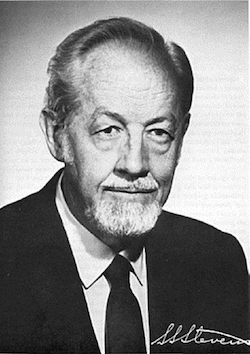Stanley Smith Stevens
Stanley Smith Stevens (November 4, 1906 – January 18, 1973) was an American psychologist known for his work in psychophysics and for developing the Stevens' power law. He was a prominent figure in the field of experimental psychology and made significant contributions to the understanding of sensory perception.
Early Life and Education[edit | edit source]
Stanley Smith Stevens was born in Ogden, Utah. He completed his undergraduate studies at the University of Utah and later earned his Ph.D. from Harvard University in 1933. His doctoral research focused on the quantitative measurement of sensation, which laid the groundwork for his future contributions to psychophysics.
Career and Research[edit | edit source]
Stevens spent the majority of his career at Harvard University, where he served as a professor and conducted extensive research in psychophysics. He is best known for formulating Stevens' power law, which describes the relationship between the magnitude of a physical stimulus and its perceived intensity. This law challenged the previously established Fechner's law and provided a more accurate model for understanding sensory perception.
In addition to his work on Stevens' power law, he developed the concept of levels of measurement, which includes nominal, ordinal, interval, and ratio scales. These levels of measurement are fundamental in the fields of statistics and research methodology.
Contributions to Psychophysics[edit | edit source]
Stevens' contributions to psychophysics include the development of methods for measuring sensory experiences and the establishment of a framework for understanding the relationship between physical stimuli and their psychological effects. His work has had a lasting impact on the study of perception and has influenced various fields, including audiology, vision science, and neuroscience.
Personal Life[edit | edit source]
Stanley Smith Stevens was married to Maxine Leonard Stevens, and they had two children. He passed away on January 18, 1973, in Vail, Colorado.
Legacy[edit | edit source]
Stevens' work continues to be influential in the fields of psychology and sensory science. His theories and methodologies are widely taught in psychology programs and are used in various applications, from clinical psychology to human-computer interaction.
See Also[edit | edit source]
References[edit | edit source]
External Links[edit | edit source]
Search WikiMD
Ad.Tired of being Overweight? Try W8MD's physician weight loss program.
Semaglutide (Ozempic / Wegovy and Tirzepatide (Mounjaro / Zepbound) available.
Advertise on WikiMD
|
WikiMD's Wellness Encyclopedia |
| Let Food Be Thy Medicine Medicine Thy Food - Hippocrates |
Translate this page: - East Asian
中文,
日本,
한국어,
South Asian
हिन्दी,
தமிழ்,
తెలుగు,
Urdu,
ಕನ್ನಡ,
Southeast Asian
Indonesian,
Vietnamese,
Thai,
မြန်မာဘာသာ,
বাংলা
European
español,
Deutsch,
français,
Greek,
português do Brasil,
polski,
română,
русский,
Nederlands,
norsk,
svenska,
suomi,
Italian
Middle Eastern & African
عربى,
Turkish,
Persian,
Hebrew,
Afrikaans,
isiZulu,
Kiswahili,
Other
Bulgarian,
Hungarian,
Czech,
Swedish,
മലയാളം,
मराठी,
ਪੰਜਾਬੀ,
ગુજરાતી,
Portuguese,
Ukrainian
Medical Disclaimer: WikiMD is not a substitute for professional medical advice. The information on WikiMD is provided as an information resource only, may be incorrect, outdated or misleading, and is not to be used or relied on for any diagnostic or treatment purposes. Please consult your health care provider before making any healthcare decisions or for guidance about a specific medical condition. WikiMD expressly disclaims responsibility, and shall have no liability, for any damages, loss, injury, or liability whatsoever suffered as a result of your reliance on the information contained in this site. By visiting this site you agree to the foregoing terms and conditions, which may from time to time be changed or supplemented by WikiMD. If you do not agree to the foregoing terms and conditions, you should not enter or use this site. See full disclaimer.
Credits:Most images are courtesy of Wikimedia commons, and templates, categories Wikipedia, licensed under CC BY SA or similar.
Contributors: Prab R. Tumpati, MD

